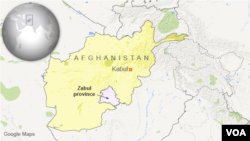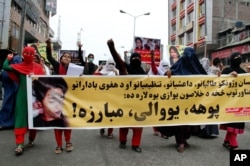Authorities in Afghanistan said unknown gunmen on Saturday kidnapped at least 20 bus passengers in a southern region where suspected loyalists of the self-named Islamic State (IS) group earlier this month beheaded seven civilian hostages, including three females.
Police officers in the volatile Zabul province said militants stopped several buses on the main highway not far from the provincial capital early in the morning and seized the passengers.
Provincial authorities told VOA Afghan security forces have launched a search-and-rescue operation in the area.
There has been no immediate claim of responsibility for the kidnappings.
Muslim sect
Most of the hostages are said to be members of the ethnic Hazara Shi'ite Muslim community.
Local officials tpld VOA that militants boarded the buses and checked identities of the passengers before capturing the Hazaras.
The incident happened on the main highway that links the capital, Kabul, with the southern Kandahar province, usually referred to as Kabul-Kandahar highway.
The incident comes just days after seven members of the Afghan minority community were allegedly beheaded by IS a month after they were kidnapped from a bus travelling between Zabul and the province of Ghazni.
Three females, including a 9-year-old girl were among the victims.
The violence provoked massive anti-government demonstrations in the Afghan capital against the IS brutality, with angry protesters blaming the government for failing to protect civilians and improve security around Afghanistan.
The demonstrations died down after President Ashraf Ghani assured protest leaders the government would promptly probe the incident to bring the culprits to justice.
Afghan officials have acknowledged the presence of Daesh -- the Arab name for the Islamic State group -- fighters in parts of Zabul and in eastern Nangarhar province.
Taliban clashes
The extremists have also recently clashed with fighters of the main Taliban insurgency in recent days.
IS, which controls large areas in Iraq and Syria, is slowly increasing its presence in Afghanistan. The terror group is said to have established a strong base in the eastern Nangarhar province that borders Pakistan.
Provincial authorities said thousands of families from Achin, Nazian and Debhala districts have recently fled their homes to escape increased Daesh brutality in these areas near the Pakistani border.
In a new survey released this past week, the San Francisco-based Asia Foundation found that 74 percent of Afghans said they have heard of IS, and more than half of them say they consider it a current or future local security threat.





